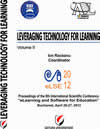THE EDUCATIONAL POTENTIAL OF COMMERCIAL COMPUTER GAMES
THE EDUCATIONAL POTENTIAL OF COMMERCIAL COMPUTER GAMES
Author(s): Ştefan Antoniu, Daniela Militaru, Carmen Elena CîrnuSubject(s): Education
Published by: Carol I National Defence University Publishing House
Keywords: Commercial computer games; education; 21st century skills
Summary/Abstract: Advances in information and communication technologies have generated a radical shift in the experiences and interests of the twenty-first century learners. The new digital technologies embedded in people’s daily life along with the massive adoption of computer games has created a diversity of new needs and preferences that has extended to reach the educational environment. The integration of computer games into the educational process has emerged as a necessity, as well as a challenging opportunity for many teachers. While researches reveal the multiple benefits that the use of computer games bring to education in terms of skills development, increased motivation and collaborative capacity, evaluation, or decision-making, game development and implementation is not an easy endeavour. Moreover, many teachers are not fully aware of the pedagogical uses and benefits of computer games. Under this premises, the authors advance commercial computer games as a valid, cost-efficient alternative for teachers that wish to experiment the potential of using games in education, and present the results of a case study that investigates potential uses of commercial computer games in education. The purpose of this paper is to inform educators on factors that could contribute to the adoption of computer games within educational environments. The paper analyses how commercial computer games can genuinely add value to education, and explores the main strength and weaknesses of employing commercial computer games for educational purposes. The results have indicated that commercial computer games represent an alternative solution for game-based learning and it can be employed successfully within specific learning processes.
Journal: Conference proceedings of »eLearning and Software for Education« (eLSE)
- Issue Year: 8/2012
- Issue No: 02
- Page Range: 319-324
- Page Count: 6
- Language: English

